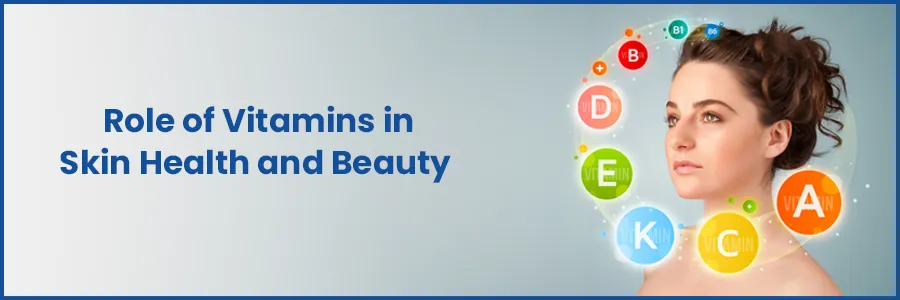- Cardiology 84
- Dermatology 45
- Endocrinology 33
- ENT 16
- Fertility 190
- Gastroenterology 78
- General-Medicine 81
- Gynecology 80
- Hematology 19
- Infectious-Diseases 33
- Neurology 52
- Oncology 34
- Ophthalmology 23
- Orthopedics 69
- Pediatrics 31
- Procedure 23
- Public-Health 144
- Pulmonology 59
- Radiology 8
- Urology 68
- Wellness 161
- Woman-and-child 77

Importance of Vitamins for Skin Health and Beauty
Healthy skin is often seen as a reflection of overall health and beauty. With the increasing impact of external factors like pollution, UV radiation, and lifestyle choices, maintaining skin health has become a priority for many.
Vitamins play a crucial role in preserving and enhancing the appearance of the skin. Here are some important vitamins that contribute to skin health.
Vitamin A: The Skin Regenerator
- Vitamin A, including retinoids and carotenoids, promotes cell turnover and repair. It is effective in reducing fine lines, wrinkles, and acne.
- Sources of vitamin A include sweet potatoes, carrots, spinach, and retinol-based skincare products.
Vitamin C: The Radiance Booster
- Vitamin C is a potent antioxidant that helps protect the skin from oxidative stress. It plays a vital role in collagen synthesis, promoting firmness, and reducing hyperpigmentation.
- Sources of vitamin C include citrus fruits, berries, peppers, and serums containing vitamin C.
Vitamin E: The Nourisher
- Vitamin E acts as a moisturizer, locking in hydration and preventing moisture loss. Its antioxidant properties protect the skin from free radicals.
- You can find vitamin E in nuts, seeds, oils, and skincare products enriched with vitamin E.
Vitamin D: The Sunshine Vitamin
- Vitamin D supports the skin's immune function and may benefit conditions like psoriasis and eczema.
- Sunlight exposure and fortified foods are good sources of vitamin D.
Vitamin K: The Circulation Enhancer
- Vitamin K contributes to blood clotting and can minimize dark circles and bruises. It also has potential for reducing visible veins and capillaries on the skin.
- Leafy greens, broccoli, and topical creams containing vitamin K are excellent sources.
B Vitamins: The Complex for Skin Health
- B vitamins (B3, B5, B6, B7, B9, and B12) contribute to skin health by managing inflammation, maintaining hydration, and supporting overall skin function.
- Sources of B vitamins include whole grains, meat, eggs, and supplements.
Vitamin Supplements and Skincare Products
- Using vitamin supplements for skin health has its pros and cons. Topical skincare products containing vitamins can be highly effective.
- However, it's important to consult a healthcare professional before starting any new supplement regimen.
A Balanced Diet for Skin Health
- A balanced diet rich in a variety of vitamins and nutrients is essential for skin health and beauty. Foods beneficial for skin health include fruits, vegetables, nuts, seeds, and whole grains.
- Overall health and skin appearance are deeply interconnected, highlighting the importance of a holistic approach.
Conclusion
- In summary, vitamins play a significant role in maintaining and enhancing skin health and beauty.
- Making informed choices about your skincare routine and dietary habits is crucial. Remember, while vitamins are essential, a holistic approach to skincare involves overall health and well-being.
Ready to take control of your health journey? Book your appointment now and start your path towards wellness today!
Book an AppointmentFrequently Asked Questions
Vitamins are essential for skin health because they play a vital role in promoting cell repair, collagen synthesis, and protection against environmental damage, contributing to a radiant and youthful appearance.
Vitamins A, C, E, and D are particularly important for skin health due to their antioxidant properties, collagen production support, and immune function enhancement.
Yes, certain vitamins like vitamin A (retinoids) and vitamin C can help reduce acne and signs of aging by promoting skin cell turnover and collagen synthesis.
Antioxidants, found in vitamins C and E, among others, help neutralize free radicals and protect the skin from oxidative stress, reducing signs of aging and preventing damage.
While supplements can complement a balanced diet, it's usually best to get vitamins from whole foods. Consult a healthcare professional before taking supplements.
Yes, vitamin deficiencies can lead to skin issues like dryness, acne, and discoloration. Adequate vitamin intake is crucial for maintaining healthy skin.
Vitamin C brightens skin, reduces hyperpigmentation, and stimulates collagen production, resulting in a more even and youthful complexion.
Yes, B vitamins like B3 (niacin) can help manage inflammation and improve the skin's barrier function, aiding in conditions like eczema.
Vitamin E is often used to moisturize and potentially reduce the appearance of scars and stretch marks, but results can vary.
A well-balanced diet rich in vitamins and nutrients supports overall health, which is reflected in the skin's appearance. Hydration and a variety of nutrients are essential.

- Cardiology 2132
- Dermatology 168
- Endocrinology 135
- ENT 97
- Fertility 217
- Gastroenterology 232
- General 478
- General-Medicine 1685
- Gynecology 169
- Hematology 85
- Infectious-Diseases 208
- Neurology 207
- Oncology 345
- Ophthalmology 65
- Orthopedics 187
- Pediatrics 83
- Procedure 72
- Public-Health 209
- Pulmonology 126
- Radiology 13
- Second Opinion 311
- Urology 294
- Wellness 600
- Woman-and-child 447
- Others 10217
Related Blogs
If you have any questions, please fill out the enquiry form or call us, and we will get back to you promptly.
040-68334455